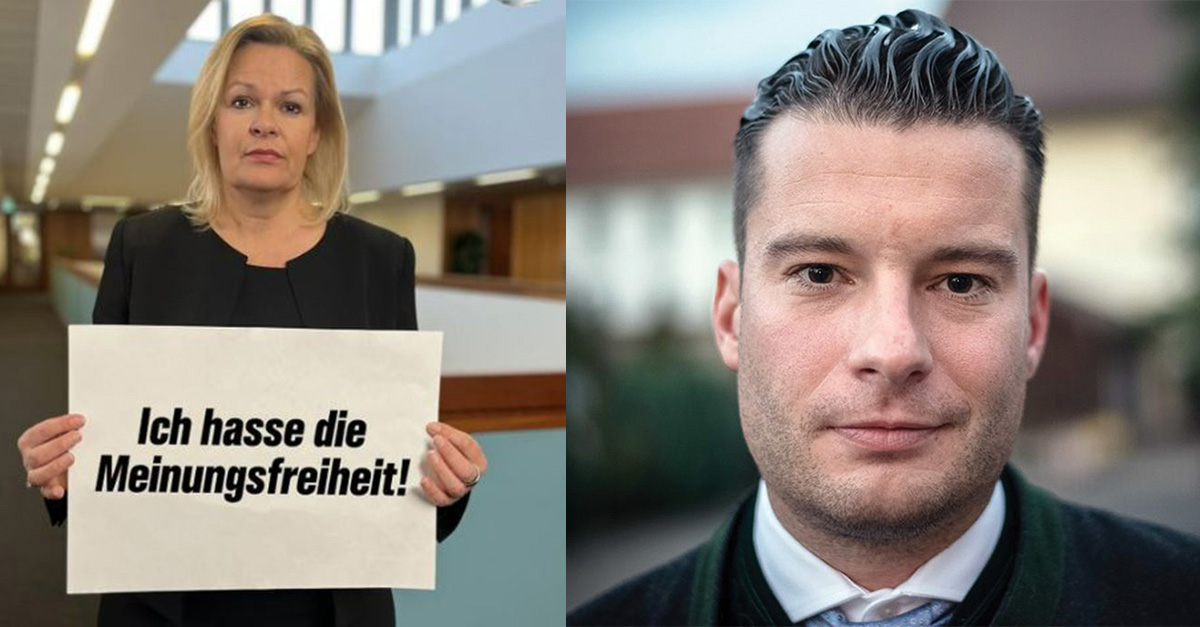


Get a free copy of Parental Rights & Education when you subscribe to our newsletter!

In a nearly farcical take, a German leader reacts to a German citizen who mocked her for hating free speech by filing criminal charges and using the full weight of the government to arrest, try, convict, and sentence that citizen.
Earlier this week, German journalist David Bendels was sentenced to a suspended prison sentence of seven months and a heavy fine for sharing an edited photo of Interior Minister Nancy Faeser.
Last February, Bendels shared a meme of Faeser holding a sign that read, “I hate freedom of speech,” in German.
Faeser has been criticized for infringing on freedom of speech. For example, last year she banned right-wing magazine Compact and has sought to silence voices deemed as extreme right, specifically referencing the sharing of memes and photoshopped images.
Following Bendels’s post, police reported the image to Faeser, who filed criminal charges under a law that prohibits defamation of political leaders.
Bendels was convicted in November and given a fine of 210 day-rates, which means his daily income multiplied by 210.
This week, a Bamberg court sentenced him to a seven-month suspended prison sentence and a fine of €1,500, or about $1,695. He was also ordered to apologize in writing to Faeser.
The court ruled that Bendels “made a deliberately false factual statement” with the photo.
“The post was not deemed to be satire, as there were no indications supporting this (it was not published in a satire magazine, there was no prior public dispute with Ms. Faeser, and the montage was not easily recognizable as such),” a court official told EuroNews.
They argued that the meme was “likely to impair [Faeser’s] public image.”
It is the harshest sentence ever given to a journalist under the law.
The sentence has drawn widespread criticism even from left-wing political leaders, who argue that while Bendels’s image, which edited a post of Faeser holding a sign remembering the victims of the Holocaust, may have been in poor taste, it should not be criminal.
Ricard Langer, former leader of the far-left Green Party, wrote on X, “Sorry, but a judgment like this has nothing to do with proportionality.”
Many called for the abolishment of the law, including Sahra Wagenknecht, leader of the far-left party BSW, who posted on X,
“Seven months’ probation for a meme? The case #Faeser says a lot about the state of #Meinungsfreiheit in Germany. A liberal society must tolerate satire, especially when it is directed against those in power. The offense of ‘insulting politicians’ under Section 188 of the German Criminal Code should be abolished!”
Mattheus Berg, founder of the Wahlwerkstatt political communications agency and supporter of Faeser’s Social Democratic Party, while making his disdain for “right-wing extremists” very clear, said,
“…ultimately this whole question has nothing to do with the political opinion held by someone who makes offensive critiques. It’s about the right that every citizen in our democracy should have the possibility to come away unpunished if they merely criticize or make an exaggerated statement about the most powerful people.”
Bendels himself responded to the conviction and sentence by promising to appeal, stating,
“We will not accept this judgment and we’ll fight it with all the legal means at our disposal. The Deutschland-Kurier and I personally will continue the just struggle for freedom of the press and for freedom of opinion with determination, resolve and consistency — for this fight is indispensable for the continued existence of democracy in Germany.”

Germany is rightfully drawing universal criticism for its policy of crushing free speech — including from its own citizens, free speech advocates, and Americans like U.S. Vice President J.D. Vance and constitutional expert Jonathan Turley.
That’s because the law is being used to punish German citizens who criticize or mock politicians.
For example, Vice-Chancellor Robert Habeck used the law to report a citizen to the police after he posted a photo calling Habeck a “professional imbecile.” The 64-year-old German, as well as his wife and daughter, who has Down Syndrome, were awoken by a dawn police raid on their home. The police seized his cell phone and tablet. Prosecutors claimed the man shared the photo to “defame Robert Habeck in general and to make his work as a member of the federal government more difficult.”
Another man was fined last year for a Facebook post that referred to former chancellor Angela Merkel as “stupid.”
These examples are far from rare.
As we reported in February, Germany proudly detailed its speech laws in a special with CBS’s 60 Minutes, noting that they prosecute thousands of “hate speech” cases each year.
The result is a German people that is now afraid to speak.
In a recent poll, only 18 percent of Germans said they feel comfortable sharing their opinions in public, while just 17 percent said they feel comfortable sharing their views on the Internet.
And a shocking 59 percent of Germans said they are not even comfortable sharing their views privately with friends.
That’s not freedom, that’s fear.
What’s more, both Germany and the European Union (EU) are also trying to expand censorship beyond their by levying obscene fines on social media companies that refuse to remove content the governments deem to be “misinformation.” Germany fines social media companies more than $500,000 per day if a company leaves a “fake news” story up, while the EU is considering imposing a fine of $1 billion on Elon Musk for reinstituting free speech on X.
When Vance criticized Germany and Europe’s leaders, some were brought to tears, not because they were remorseful but because they were enraged and appalled that the United States would dare say that they have become authoritarian.
The reality, though, is that if Vance was a German citizen who posted his speech to the Internet, that post would have been removed and he likely would have been arrested and jailed.
Germany won’t allow a person to criticize the government or its policies.
The EU showed its response to Vance’s call for shared values on free speech and freedom of religion by hosting a conference calling for “A New World Order with European Values,” during which they called for increased censorship and a move away from the values of the United States.
This isn’t a uniquely European problem, however; the American left also seeks to criminalize and censor any speech or Internet posts that it considers misinformation or hateful.
Just last year, California passed a law that would have criminalized a post like Bendels’s, but it has, fortunately, been blocked in court after the law was challenged by Christian satire site The Babylon Bee.
It’s true that in this world of edited images and AI, there should be a way to protect people from defamation. And certainly, no one, as a matter of principle, should traffic in lies or slander. Yet as was stated in the suit over the California law, if a newspaper or private citizen is forced to put a disclaimer over the top of a satirical image, it loses its effect.
If satire, particularly the kind intended to call out, make fun of, or criticize government officials, is made illegal in any country, that country is no longer free because such censorship provides authoritarians with the power they need to silence its people, chill debate, and hide the truth.
Do Habek or Faeser’s actions seem any different than the Chinese Communist Party banning Winnie the Pooh because some were using the lovable character to mock leader Xi Jinping?
The reality is that Germany and China really aren’t very different anymore.
Freedom of speech has to be diligently guarded, or it is soon lost completely. Laws allowing the government to censor “misinformation” or “hateful content” have now become laws that outlaw any criticism of elected politicians and government officials. Any country that adopts this kind of censorship and enforces it using the police and government power is not free.
Which means that Germany has once again proven that J.D. Vance was exactly right.
PHOTO: (l) The meme of Interior Minister Nancy Faeser holding a doctored sign that, translated, reads: “I hate free speech”; and (r) David Bendels, owner and editor of Deutschland-Kurier, a populist magazine in Germany CREDIT: Deutschland-Kurier X post; Creative Commons Wikipedia
If you like this article and other content that helps you apply a biblical worldview to today’s politics and culture, consider making a donation here.

Notifications